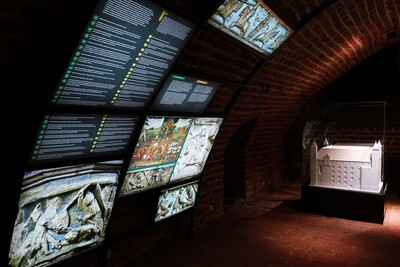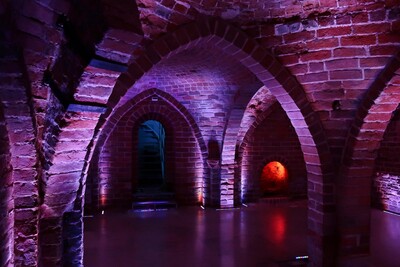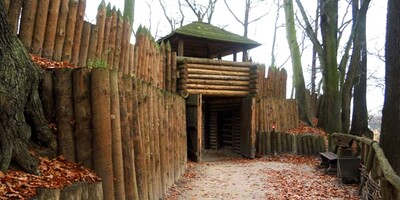Archaeological Museum in Gdańsk (short: MAG) has been operating as an independent institution since January 1, 1962 Earlier, from 1953, there was an archaeological department in the former Pomeranian Museum in Gdańsk (in 1958 this department was transformed into the Archaeological Department).
The Naturalists’ House
The Naturalists’ House has a distinctive 30-metre-high façade, but its most striking feature is the slender, 36-metre high staircase tower nestled in the corner between the building’s north elevation and St Mary’s Gate (Brama Mariacka). The tower is crowned by a beautiful Mannerist cupola. The building’s architectural highlights do not stop there. Alongside the main entrance on ul. Mariacka is a characteristic raised terrace decorated with carved stone panels. The carvings depict female figures personifying various branches of science: Astronomy, Geography, Medicine and Natural Science.
This townhouse was probably built to a design by Antoni van Obberghen during 1597–1599 on the commission of a merchant named Hans Köpe. Originally it served as both a residential property and a warehouse. The side of the building overlooking the River Motława was embellished with a multistorey oriel (a part of the building that projects beyond its façade) topped by a double gable, something rarely noted in Gdańsk.
The building was given its name after becoming the seat of the Gdańsk Natural Science Society in 1846. The Society was founded in 1743 by the distinguished scholar Daniel Gralath, later mayor of Gdańsk. In its new townhouse home the Society set up meeting and study rooms, a small museum and a library with some 20,000 books. The interiors were decorated with portraits of eminent scientists, among them Nicholas Copernicus, Mathias Nathanael Wolff and Daniel Gralath, and a bust of Johannes Hevelius which was a gift from the last king of Poland, Stanisław August Poniatowski. In 1866 an astronomical observatory was installed in the tower, and the decorative cupola was replaced for some time by a rotating dome.
The building was badly damaged during the Second World War – the only parts of it that survived were its front elevation and tower. It was rebuilt during 1956–1961 to a design by Kazimierz Macur, in a form similar to the original, but adapted to meet the needs of the newly established Archaeological Museum.
Today the first three floors of the Naturalists’ House and the annexe adjoining it contain permanent exhibitions mostly devoted to the prehistory of Pomerania. The next three floors and the adjacent St Mary’s Gate are occupied by museum offices and research facilities.
| when? | name | where? | about what? | for free | for children | |
|---|---|---|---|---|---|---|
 | Gniew. The Town of the Route of Great History Permanent exhibition | The castle in Gniew pl. Zamkowy 2 83-140 Gniew Pomeranian | archeology, city, utility items, weapons and militaria | yes | ||
 | The oldest history of Kępa Dominikańska Permanent exhibition | Romanesque Cellar pl. Dominikański 1 80-844 Gdańsk Pomeranian | archeology, city | |||
 | Gdańsk w świecie Hanzy Permanent exhibition | The "Blue Lamb" granary ul. Chmielna 53 80-748 Gdańsk Pomeranian | archeology, city, medicine, numismatic items, toys, utility items | yes | ||
 | Wyspa Spichrzów w Gdańsku Permanent exhibition | The "Blue Lamb" granary ul. Chmielna 53 80-748 Gdańsk Pomeranian | archeology, documents | yes | ||
 | Średniowieczna uliczka hanzeatycka Permanent exhibition | The "Blue Lamb" granary ul. Chmielna 53 80-748 Gdańsk Pomeranian | archeology, city, interiors and everyday life | yes | ||
 | Miasto pod miastem Permanent exhibition | The "Blue Lamb" granary ul. Chmielna 53 80-748 Gdańsk Pomeranian | anthropology, archeology | yes | ||
 | Grodzisko w Sopocie Permanent exhibition | Sopot „Stronghold” ul. Haffnera 63 81-715 Sopot Pomeranian | archeology, city, crafts, interiors and everyday life, martyrology, utility items, weapons and militaria | yes | yes |